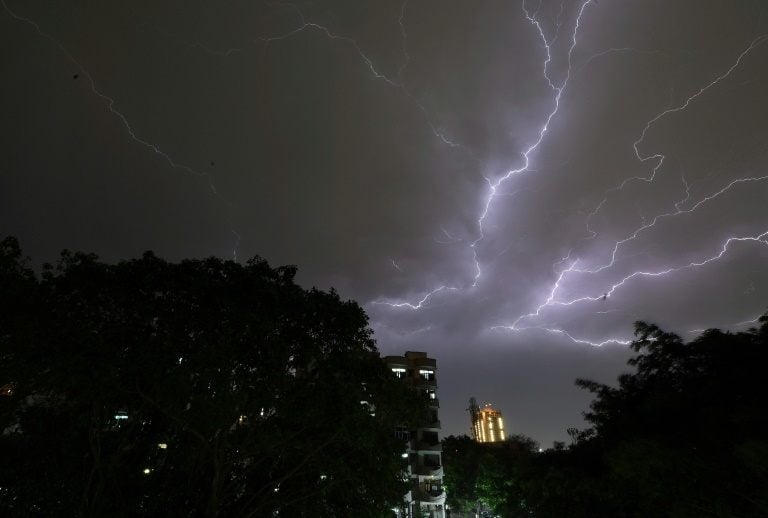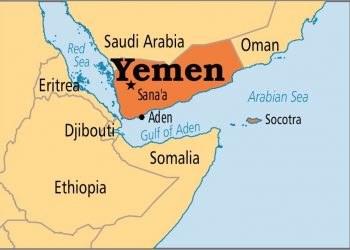Lightning strikes and powerful dust storms across India have killed at least 116 people and injured more than 250 as meteorologists warned Thursday of more wild weather on the horizon.
Dust clouds plunged swathes of north India into darkness as winds of more than 130 kilometres per hour (80 miles per hour) brought down feeble mud houses and killed people where they slept.
Walls, trees and electricity pylons were torn down in parts of Uttar Pradesh, Rajasthan and Punjab states where officials said the death toll was expected to rise.
The destructive winds were followed by fierce lightning storms and rains.

Similar storms kill hundreds of people each year in India but these were some of the most severe in recent decades.
Shivam Lohia, who owns a resort hotel in Alwar district of Rajasthan, said he abandoned his car on the road and ran for his life after it was almost blown away.
“I haven’t seen such a devastating storm in at least 25 years. Everyone was scared and running for cover as trees and homes were getting blown away. It was a nightmare,” Lohia told AFP.
There were 65 confirmed deaths in Uttar Pradesh in the north, 35 in the desert state of Rajasthan to the west, and two in Punjab from Wednesday’s wild storms.
The day before, at least 14 were killed in the southern state of Andhra Pradesh which was hammered by more than 41,000 lightning strikes in a matter of hours, disaster officials said Thursday.
 AFP / PRAKASH SINGHStorms kill hundreds of people each year in India but these were some of the most severe in recent decades
AFP / PRAKASH SINGHStorms kill hundreds of people each year in India but these were some of the most severe in recent decadesAgra district of Uttar Pradesh was one of the worst hit by the dust clouds, with more than 40 people killed. The Taj Mahal is in Agra city but officials said the monument escaped damage.
Last month, a similar storm killed at least 15 people in Uttar Pradesh and destroyed two minarets over an entry house to the Taj Mahal.
Most of the victims were killed as they slept by houses that collapsed or by falling walls, trees and electric pylons, officials said. Many people in India sleep outside during the summer months to escape the high temperatures.
Rescuers were still going through the rubble of felled homes on Thursday.
 AFP / –Agra district was one of the worst hit, with 43 killed in the dust storms
AFP / –Agra district was one of the worst hit, with 43 killed in the dust storms“We can confirm at least 65 deaths from around 40 of the state’s 75 districts,” T.P. Gupta of the Uttar Pradesh relief commissioner’s office told AFP. He called the death toll “unprecedented” from such a storm in the past 20 years.
Gupta said there were 43 deaths in Agra district. More than 150 cattle and other animals were also killed across the state.
“There is a forecast for more storms in the next 48 hours across the state so people should be alert,” he added.
Hemant Gera, head of Rajasthan’s Disaster Management and Relief Department, said emergency services were on alert and that people should not sleep outdoors.
In Punjab, Kumar Amit, deputy commissioner of Patiala district, told AFP that a wall collapsed killing two people.
– Power cut –
The India Meteorological Department warned there would be more storms over a wider area up to Saturday.

Three districts in Rajasthan, a state popular with tourists for its heritage palaces and colourful culture, were hit the hardest on Wednesday.
“Most of the 35 deaths and 205 injuries across our state were from three districts Alwar, Dholpur and Bharatpur,” Gera told AFP.
Weather department officials in New Delhi said the storm was caused by a collision of rival eastern and western weather systems over the humid northern plains.
Charan Singh, a scientist at India Meteorological department, said winds of 132 kph hit Agra while even in the capital Delhi there were gusts of 59 kph.
Power was cut in many parts of Rajasthan as thousands of electricity pylons were destroyed. Officials said it could take more than two days to restore power.
The state government quickly released funds to compensate the families of those killed or for damage. About $6,000 would be given to the families of each of the dead.
“Saddened by the loss of lives due to dust storms in various parts of India. Condolences to the bereaved families. May the injured recover soon,” Prime Minister Narendra Modi said on Twitter.
“Have asked officials to coordinate with the respective state governments and work towards assisting those who have been affected,” he added.

















